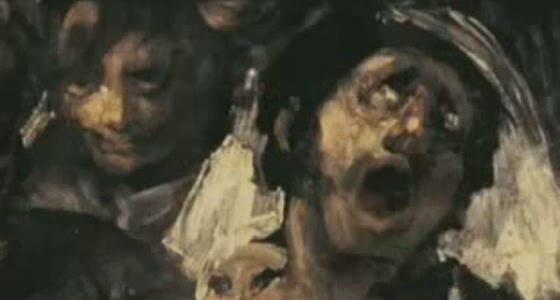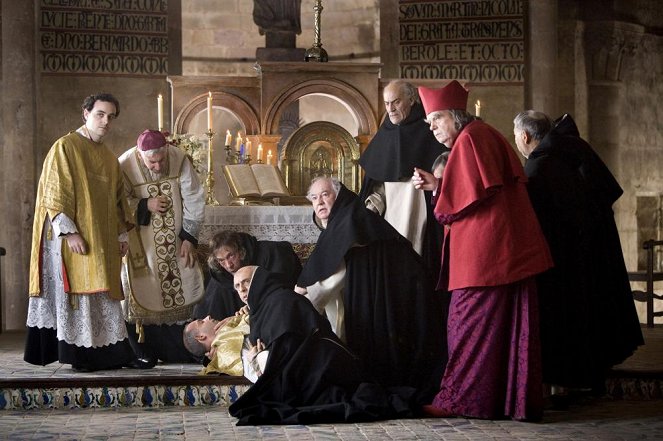Directed by:
Miloš FormanCinematography:
Javier AguirresarobeComposer:
Varhan Orchestrovič BauerCast:
Javier Bardem, Natalie Portman, Stellan Skarsgård, Randy Quaid, José Luis Gómez, Michael Lonsdale, Blanca Portillo, Mabel Rivera, Unax Ugalde (more)VOD (3)
Plots(1)
The lives of a great artist, a corrupted holy man, and a beautiful woman cross paths at a crucial moment in history in this epic-scale historical drama. Near the end of the 18th century, Francisco Goya is a gifted but controversial artist whose provocative and often satirical work has earned the enmity of the Spanish government as well as the Catholic Church, who hold tremendous power as the Inquisition rages. Surprisingly, Brother Lorenzo, a monk involved in the Inquisition, has hired Goya to paint a portrait of himself, and to prove to the Inquisitor General he is not in cahoots with the renegade artist, Lorenzo targets Ines, one of Goya's favourite models, as a possible heretic. Under torture from Lorenzo, Ines signs a false confession, and her wealthy and powerful father, Toms Bilbata, offers Lorenzo a taste of his own medicine by brow-beating him into signing a document confessing that his mother was an ape. Lorenzo flees Spain as his reputation lies in tatters, and Goya earns greater infamy as he paints a wildly unflattering portrait of Queen Mara Luisa under commission from her husband, King Carlos IV , but Ines remains in prison because of her coerced confession. Fifteen years later, Lorenzo has become a follower of the Enlightenment, and returns to Spain as Napoleon's forces storm the nation and the Inquisition finally collapses. He attempts to liberate Ines from prison but a shocking discovery awaits him. (CinEast)
(more)Videos (1)
Reviews (9)
Against the backdrop of the shadowy side of modern Spanish history, Forman once again delivers his spectacular play. It is stunning with its sets, costumes, and, last but not least, an amazing atmosphere that breathes life into Goya's cruelly pessimistic paintings, worth experiencing for 120 minutes. The acting trio works perfectly with the director in their brilliantly acted parts. Stellan Skarsgård IS a Goya, Natalie is great like never before (and it's not just about getting naked here, as subliminal marketing everywhere proclaims), and Javier Bardem's mesmerizing demon literally destroys the screen with his performance. Forman is back in full force after seven years, once again mixing his genres properly, resulting in a stylish spectacle that may not grab you immediately, but resonates all the more when the credits roll.
()
This movie didn't affect me as much in the cinema, before those already ten years ago, as I thought it would, but over the years I see that the criticism, not only of the church but primarily of humanity, is simply functional and shows the monstrosity that lies hidden within us and that surfaces if we are given the opportunity and if we allow evil to prevail.
()
As a TV production - okay, but as a full-blooded work by one of the best directors in the world? The sad, mediocre result stems from the miserable visuals, actors with almost nothing to act and primarily the dumb screenplay. This is made up of two absolutely disconnected parts, neither of which holds any water. The topic itself isn’t bad and the painter Goya, the Spanish Inquisition and the Napoleonic era certainly all have potential, but are absolutely unexploited. In the end, the movie contained something of all of the above, but together the result is nothing. Maybe Forman found himself forced to do a lot of cutting, but in that case the better half of the movie ended up on the cutting room floor. Let’s hope that they’ll release a director’s cut sometime. Overall it lacks energy (apart from two or three scenes) and staying power. The character of Goya is absolutely superfluous for the movie and so the only over-average element here is the soundtrack by Varhan Bauer. So the most powerful part of Goya’s Ghosts are the ending credits, when the camera gives us close-ups of details of Goya’s canvases and the orchestra starts to play full on.
()
In his typical masterful way, the best Czech director portrays the hard reality of the French Revolution and the hardships of ordinary people and, with the support of excellent actors, especially in the first act, he manages to draw the viewer into a promising story without any problems. But gradually, Forman runs out of breath, the plot becomes terribly weak and unfinished for such an ambitious film, and the end comes out of the blue and without much emotion. Yes, I learned about the uncompromising methods of the Inquisition of the time, but that doesn't make Goya's Ghosts an above-average drama.
()
I don't question the message and the strong idea Forman was trying to get across. I will make an odd analogy: while a film such an Amadeus is like a roasted turkey with delicate stuffing, crispy fried potatoes and a hearty vegetable garnish, accompanied a Sauvignon Blanc vintage 2004, Goya's Ghosts evokes a toast with garlic and a glass of sparkling mineral water. Nothing wrong with that, it will fill you up, but with a different end result for your taste buds :)
()



Ads